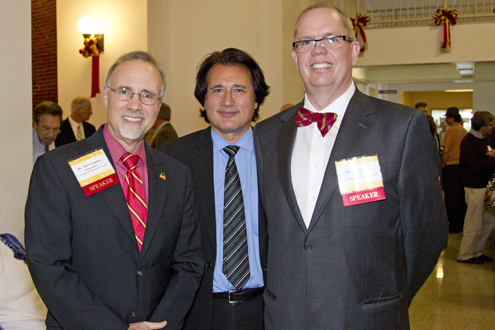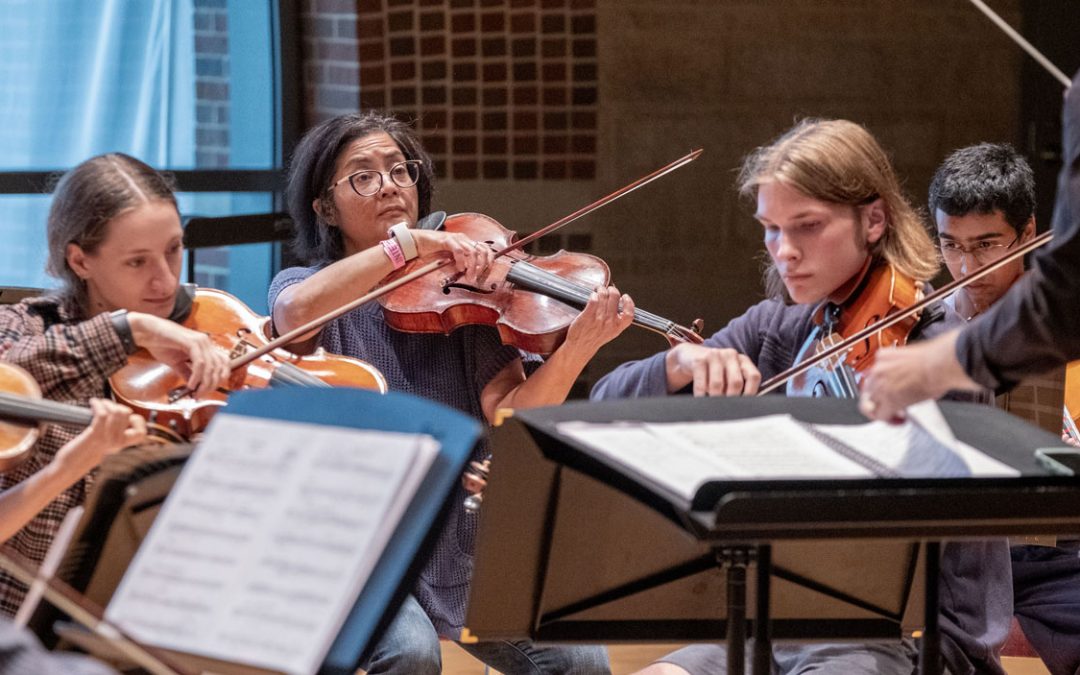
The Missouri Institute of Mental Health at UMSL turns 50 this year. Among those celebrating the anniversary during a reception at MIMH were (from left) UMSL Chancellor Tom George; Nasser Arshadi, vice provost for research at UMSL; and Joseph Parks, director of MIMH. (Photo by August Jennewein)
The Missouri Institute of Mental Health marked 50 years of service to the community with a public celebration on Oct. 1.
MIMH became a unit of the University of Missouri–St. Louis in 2010 after being operated by the University of Missouri–Columbia for many years. The institute offers research, evaluation, policy and training expertise to organizations seeking to improve the behavioral health services they provide to patients.
“This is a very big year for us,” MIMH Director Joseph Parks said to a packed crowd at MIMH, 5400 Arsenal St. in St. Louis. He said going forward the institute will strive to become the leading provider of behavioral health research, evaluation, training and services.
UMSL Chancellor Tom George recalled that when the partnership began two years ago he was “blown away” after meeting the scientists and touring the facilities. He jokingly added that what really sealed the deal was when they went to lunch at Cunnetto House of Pasta.
“It’s a stones throw away, and I thought any place that goes to lunch at Cunnetto’s has to be alright,” George said.
Nasser Arshadi, vice provost for research at UMSL, who oversees MIMH for the university, was also reflective in his words at the celebratory reception.
“I have often been asked about the how and the why of MIMH,” Arshadi said. “My answer was then and still is simple: MIMH matters. Its research matters. Its community outreach matters.”
MIMH helps create modern and effective treatment programs based on sound research principles. The bulk of what it does is deploy programs – that have been shown to work through research – to clinical practices.
MIMH has provided suicide prevention training statewide for 10 years. Some of the suicide prevention programs are targeted at schools, while other programs are aimed at the general public.
Question, Persuade, Refer is an MIMH program where people are trained to recognize the warning signs of a person contemplating suicide and how to question, persuade and refer them for help.
Another successful MIMH program is Screening, Brief Intervention and Referral to Treatment. In emergency rooms and primary health clinics patients undergo a quick screening to assess their alcohol and drug abuse. If they’re at risk for developing a serious problem, they receive a brief intervention. Patients who need more extensive treatment are referred to specialty care professionals.
Girls Holla Back aims to reduce substance abuse and new cases of HIV and AIDS among black females living in the St. Louis area. The most recent program session kicked off in March and had nearly 60 participants.
MIMH will commemorate its 50th anniversary with a three-part film series throughout October. The movies are free and open to the public, and will be screened at MIMH.
- “Tarnation” starts at noon Oct 8. The documentary by filmmaker Jonathan Caouette chronicles his life with a schizophrenic mother.
- “One Flew Over the Cuckoo’s Nest” starts at noon Oct. 15. It’s an adaption of Ken Kesey’s classic novel about an insane asylum in the 1960s. The film stars Jack Nicholson.
- “People Say I’m Crazy,” starts at noon Oct. 29. The documentary is based on the findings of a 1987 survey conducted by mental health consumers that explored what factors promoted or deterred the well being of persons commonly labeled as mentally ill in California.
For more information, contact Andrea Purnell at 314-877-6404 or Andrea.Purnell@mimh.edu.














